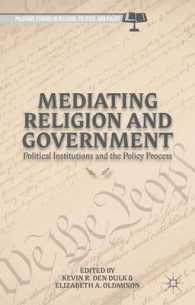Full Description
This book addresses the distance between contemporary philosophical critiques of education and the classroom context by applying new insights from social philosophy, neurology and historical analysis to common school practices.
Critiquing contemporary academic and political debates concerning the use, and misuse, of assessment tools, psychometric testing and classroom management on pupils, this book looks in detail at the consequences of such practices for pupil management and the nurturing of their emerging democratic voices and sense of independence. This book explores these practices in the context of broader social phenomena such as the state of exception, management for legibility, self‑regulation, governmentality and epidemiology. Chapters link critical and philosophical considerations about politics, administration and the brain to real‑world classroom realities and everyday educational activities, forming an important contribution to the wider discourse on learning and inclusion in contemporary school systems.
Bringing philosophical and historical insights to bear on the concrete practices of educational life, this book will be of interest to scholars, researchers and postgraduate students in the field of philosophy of education as well as schooling, classroom practice, and pedagogy and didactics more broadly.
The Open Access version of this book, available at www.taylorfrancis.com, has been made available under a Creative Commons Attribution-ShareAlike (CC-BY-SA) 4.0 license.
Contents
1. On governing autonomy - education for self-regulation and management Part 1 Pupil management 2. On leprosy and plague - what are the mechanisms of inclusion? 3. On states of emergency - the rights given and taken away in exceptional education 4. On Civilization - how legible classrooms structure the gaze of teachers and pupils Part 2 Emerging democratic voices 5. On hemispheres - diagnostic conversations and attentiveness 6. On plastic brains - pupil flexibility and explosivity 7. On populations and parliaments - education for peaceful lives and world transformation







